

Abel Questions Chapter Human Sciences.pdf. Abel Man is the Measure Human Sciences.pdf. How do we acquire knowledge in the human sciences? Naturalist and Interpretivist approaches Actually, assuming that we can be objective – ie, make value-free judgements whereby both the subjects of an investigation and the investigators do not bring into the study their own personalities, beliefs and feelings – is something that not everyone agrees with.

It is true that many scholars think that you can apply the methods of natural science to the study of social behaviour, and treat human subjects just as you do animals or objects in the natural world. They are known as ‘naturalists’. Real life situations and KQs for the human sciences. Methodology in Human and Natural Sciences by Richard Glover. How Many of Your Memories Are Fake? - Erika Hayasaki. One afternoon in February 2011, seven researchers at the University of California, Irvine sat around a long table facing Frank Healy, a bright-eyed 50-year-old visitor from South Jersey, taking turns quizzing him on his extraordinary memory.

Observing from outside of the circle, I tape-recorded the conversation as one researcher tossed out a date at random: December 17, 1999. “Okay,” Healy replied, “Well, December 17, 1999, the jazz great, Grover Washington Jr., died while playing in a concert.” “What did you eat that morning for breakfast?” “Special K for breakfast. Liverwurst and cheese for lunch. These are the kinds of specific details that writers of memoir, history, and journalism yearn for when combing through memories to tell true stories. In another office nearby on campus, you can find Professor Elizabeth Loftus, who has spent decades researching how memories can become contaminated with people remembering—sometimes quite vividly and confidently—events that never happened.
- StumbleUpon. 10 Psychological States You've Never Heard Of... and When You Experienced Them. 50 Common Cognitive Distortions. 3. Negative predictions. Overestimating the likelihood that an action will have a negative outcome. 4. Underestimating coping ability. Underestimating your ability cope with negative events. 5. Thinking of unpleasant events as catastrophes.
Erika Christakis: Why Mass Killers Are Overwhelmingly Male. There’s a predictable cycle of mourning and recrimination that follows a massacre like the shootings last week in Aurora, Colo.
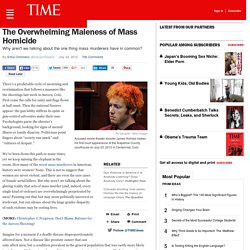
First come the calls for unity and flags flown at half-mast. Then the national fissures appear: the gun lobby stiffens its spine as gun-control advocates make their case. Psychologists parse the shooter’s background, looking for signs of mental illness or family disarray. Who's in charge – you or your brain? David Eagleman, neuroscientist at Baylor College of Medicine in Texas and bestselling author It is clear at this point that we are irrevocably tied to the 3lb of strange computational material found within our skulls.
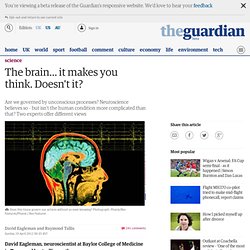
The brain is utterly alien to us, and yet our personalities, hopes, fears and aspirations all depend on the integrity of this biological tissue. How do we know this? Because when the brain changes, we change. Scottish people's DNA study could 'rewrite nation's history' A large scale study of Scottish people's DNA is threatening to "rewrite the nation's history", according to author Alistair Moffat.

Scotland, he told the Edinburgh international book festival, despite a long-held belief that its ethnic make-up was largely Scots, Celtic, Viking and Irish, was in fact "one of the most diverse nations on earth". "The explanation is simple. We are a people on the edge of beyond; on the end of a massive continent. Peoples were migrating northwest; and they couldn't get any further. We have collected them. " He and his colleagues have found West African, Arabian, south-east Asian and Siberian ancestry in Scotland. ‘History of the World in 100 Objects,’ From British Museum. Trustees of the British Museum A double-headed serpent Aztec figurine from Mexico (A.D. 1400-1600), part of a project to tell the history of the world in 100 objects from the British Museum.
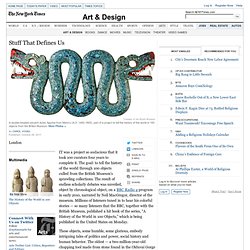
More Photos » IT was a project so audacious that it took 100 curators four years to complete it. The goal: to tell the history of the world through 100 objects culled from the British Museum’s sprawling collections. The result of endless scholarly debates was unveiled, object by chronological object, on a BBC Radio 4 program in early 2010, narrated by Neil MacGregor, director of the museum. Noted Dutch Psychologist, Stapel, Accused of Research Fraud.
The psychologist, Diederik Stapel, of Tilburg University, committed academic fraud in “several dozen” published papers, many accepted in respected journals and reported in the news media, according to a report released on Monday by the three Dutch institutions where he has worked: the University of Groningen, the University of Amsterdam, and Tilburg.
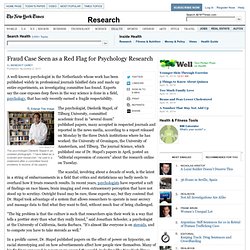
The journal Science, which published one of Dr. It's a Jumble Out There - 00.09. The Mynachlogddu-to-Stonehenge trek continues a long tradition of experimental archaeology, with intrepid researchers exploring historical mysteries and putting speculative solutions to the test.
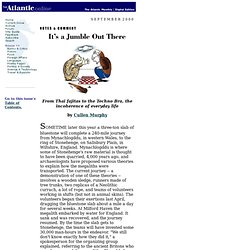
Admiral Samuel Eliot Morison, a skilled navigator, sought to reconstruct the voyages of Columbus. Got Silk. As soon as I walk into the humid goat shed in my Tyvex suit and sterilized boots, a dozen Nubians run up to the fence and begin sniffing at me, their Roman noses dilated with fervent curiosity. ''They're a little frisky,'' a technician explains, shooing them back toward their playpen toys. ''It's artificial insemination time, you know.''
